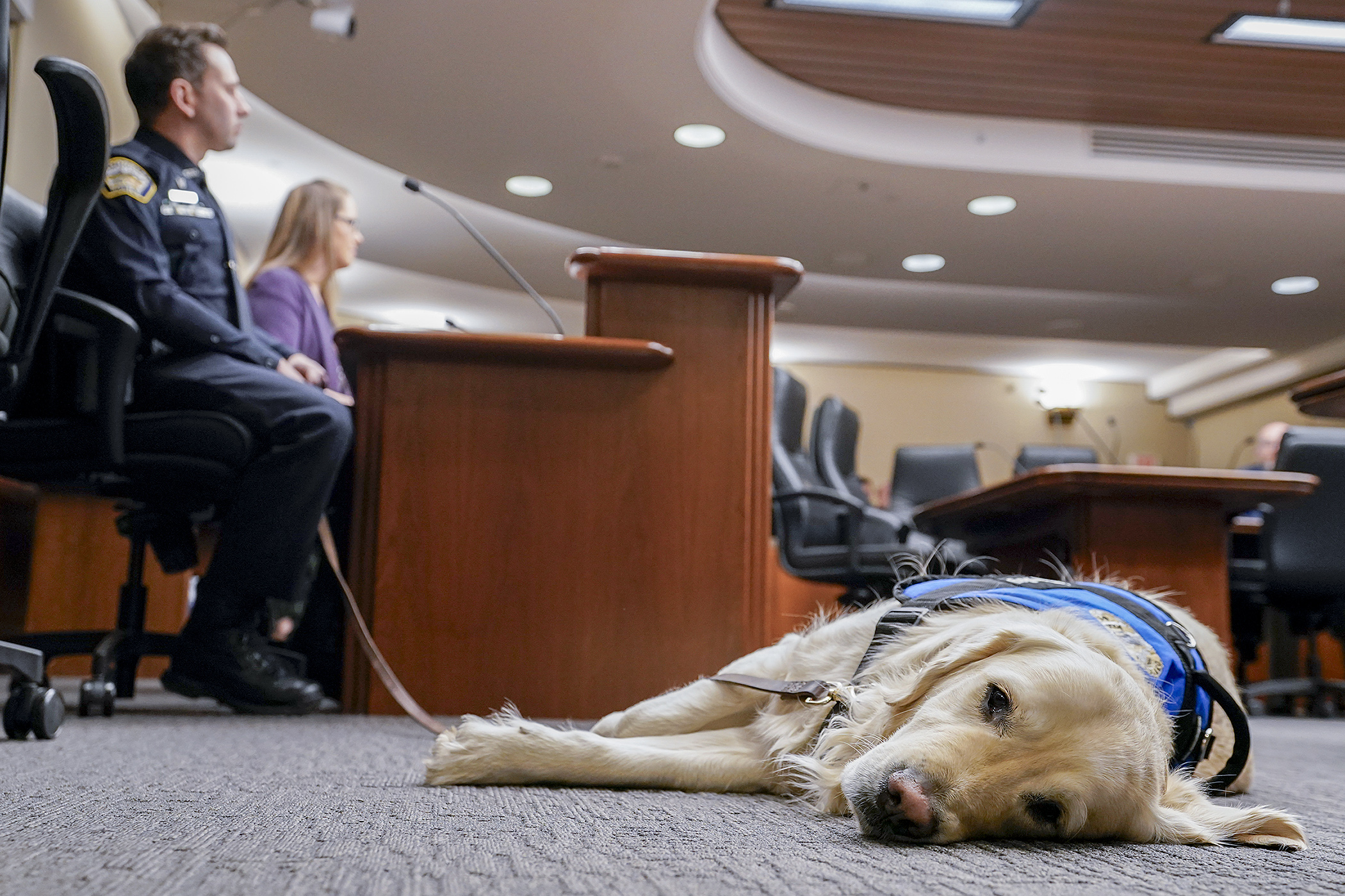Funds for more four-legged friends could help MN law enforcement, victims deal with trauma

In the name of decorum, props are usually not permitted at the testifier’s table in House committee hearing rooms, especially large ones, weighing, say about 80 pounds and the size of, well, a full-grown English golden retriever.
Otis was a very good boy Tuesday and obeyed those rules by sitting and lying quietly on the floor next to the testifier’s table while two humans spoke on legislation that would fund more therapy dogs like him to be trained and placed at law enforcement agencies around the state.
Otis is a silent type, so he let his partner, Woodbury Police Detective Adam Sack describe his important role as a therapy dog stationed at the department’s headquarters.
“As our first responders return to the building after a stressful emergency call for service, Otis is there to greet them upon their return with a tail wag, looking for a belly rub,” he said.
But the work Otis does is also very serious. Last year, he and Sack responded to 68 different crisis calls and follow-up visits in the field.
“He provides comfort on crisis calls to dog lovers and provides a calming presence and non-judgmental companionship to those who are struggling,” Sack said.
Rep. Patricia Mueller (R-Austin) sponsors HF4215 that would fund more therapy dogs like Otis. The bill was laid over, as amended, by the House Public Safety Finance and Policy Committee.
Mueller spoke of the dire need for more resources to help peace officers deal with the high number of traumatic calls they will likely experience in their careers.
“Police and other first responders are exposed to an average of 178 critical incidents throughout their career, while an average person encounters only two or three traumatic events in their life,” Mueller said, citing an FBI report published last year.
The bill would appropriate an unspecified amount of money in fiscal year 2025 for the Department of Public Safety to issue grants to nonprofit organizations that train and place therapy dogs in state and local law enforcement agencies to aid in treating peace officers suffering from job-related trauma and post-traumatic stress disorder, and to assist in responding to calls involving persons in crisis.
Mueller wants to wait until the committee gets its budget target before filling in the appropriation line.
Grants would preferentially go to law enforcement agencies whose officers suffer a high rate of job-related trauma or post-traumatic stress disorder or are exposed regularly to high-stress incidents that are known to cause job-related trauma or post-traumatic stress disorder.
Related Articles
Search Session Daily
Advanced Search OptionsPriority Dailies
Speaker Emerita Melissa Hortman, husband killed in attack
By HPIS Staff House Speaker Emerita Melissa Hortman (DFL-Brooklyn Park) and her husband, Mark, were fatally shot in their home early Saturday morning.
Gov. Tim Walz announced the news dur...
House Speaker Emerita Melissa Hortman (DFL-Brooklyn Park) and her husband, Mark, were fatally shot in their home early Saturday morning.
Gov. Tim Walz announced the news dur...
Lawmakers deliver budget bills to governor's desk in one-day special session
By Mike Cook About that talk of needing all 21 hours left in a legislative day to complete a special session?
House members were more than up to the challenge Monday. Beginning at 10 a.m...
About that talk of needing all 21 hours left in a legislative day to complete a special session?
House members were more than up to the challenge Monday. Beginning at 10 a.m...